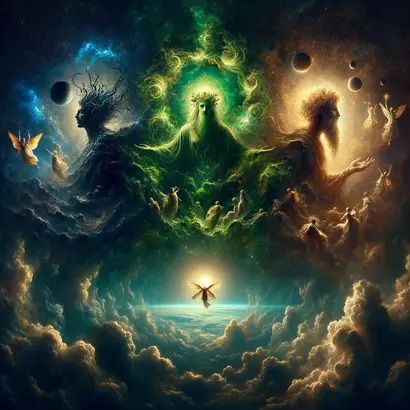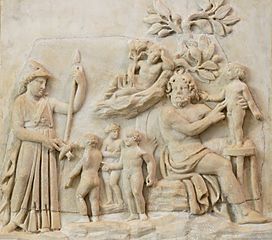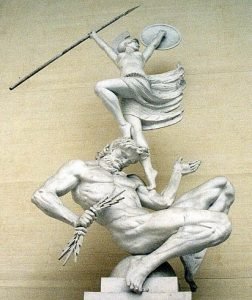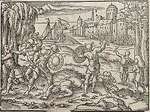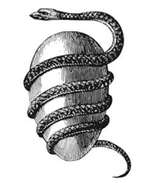
The Creation II
Perhaps the most confusing aspect of this myth is the extensive use of names that seem difficult to non-native Greek speakers to pronounce. This sometimes causes frustration and loss of track when trying to establish the continuing relationship between these characters in the birth of the world. So, please be patient and try to associate these names with the characters and events that took place
The Beginning
It all started when Chaos, Gaea (Earth) and Eros started sleeping with each other, leading to the Gods. So, in Greek mythology, the creation of the world starts with the creation of the different classes of Gods. In this instance, the term 'gods' refers to the characters that ruled the Earth (without necessarily possessing any divine attributes) until the 'real' Gods, the Olympians, came. So after this brief introduction, the next step to examine is the creation of the Gods (which really is the same thing, it's just that when you are interested in the creation of the world, you look at the very beginning of the creation of the Gods, while, to examine the creation of the Gods, you have to look a little deeper).
Hesiod's Theogony
Hesiod's Theogony is one of the best introductions we have on the creation of the world. According to Hesiod, three major elements took part in the beginning of creation; Chaos, Gaea, and Eros. It is said that Chaos gave birth to Erebos and Night, while Uranus and Oceanus emerged from Gaea. Each child had a specific role, and Uranus' duty was to protect Gaea. Later, the two became a couple and
were the first Gods to rule the world. They had twelve children known as the Titans, three known as the Cyclopes, and three Hecatoncheires, the hundred-handed Giants.
A Cruel Father
The situation from here on however wasn't very peaceful. Uranus was a cruel father, afraid that he might be overthrown by his children; thus, he decided that his children belonged deep inside Gaea, hidden from himself and his kingdom. Gaea, infuriated with this arrangement, agreed at first, but later chose to help her children. She devised a plan to rid her children from their tyrant father, and supplied her youngest child Cronus with a sickle. She then arranged a meeting for the two, in which Cronus cut off his father's genitals. The seed of Uranus which fell into the sea gave birth to Aphrodite, while from his blood were created the Fates, the Giants, and the Meliad nymphs.
Cronus the new leader
Cronus succeeded his father in the throne and married his sister Rhea. He also freed his siblings and shared his kingdom with them. Oceanus was given the responsibility to rule over the sea and rivers, while Hyperion guided the Sun and the stars. When Cronus and Rhea started having their own children, Cronus was possessed by the very same fears that haunted his father.
Cronus eventually decided that the best way to deal with this problem was to swallow all his children.
Of course, Rhea was very displeased and devised a plan to free her children. She managed to hide her youngest child, Zeus, from Cronus, by tricking him into swallowing a stone wrapped in infant clothes instead of the baby himself.
The Great Zeus
The great Zeus was brought up by the Nymphs on Mount Dikte in the island of Crete. In order to cover the sound of his crying, the Kouretes danced and clashed their shields. As Zeus entered manhood, he gained the strength few would dare dream of. He overthrew his father, and freed his siblings from his father's stomach, taking the throne and the rule of the universe.
The Human Race
According to the myths, the immortal Gods thought that it would be interesting to create beings similar to them, but mortal, in order to inhabit the earth. As soon as the mortals were created, Zeus, the leader of the Gods, ordered the two sons of the Titan Iapetus, Prometheus and Epimetheus, to give these beings various gifts in the hope that the mortals would evolve into interesting beings, able to amuse the Gods.
Fire and Reason
So the two brothers started to divide the gifts among themselves in order to give them to the earth's inhabitants. Epimetheus asked his brother to give out the gifts first; he gave the gift of beauty to some animals, agility on other animals, strength in others, and agility and speed to some. However, he left the human race defenseless, with no natural weapons in this new kingdom. Prometheus, who liked the human race, upon realizing what had happened, promptly distributed his own gifts to mankind. He stole reason from Athena, giving it to man. He then stole fire from the gates of Hephaestus, to keep them warm. Prometheus then became the protector of the human race, and shared with it all the knowledge he had.
Prometheus' Punishment
This new situation angered Zeus, for fire until now had been a gift only reserved for the Gods and he did not want the human race to resemble the Gods. Zeus's next step was to punish Prometheus. And a heavy punishment it was. Zeus chained Prometheus on a peak in the Caucasus, which was believed to be at the end of the world. He had an eagle eat his liver every single day for thirty years. At the end of each day, Prometheus' liver would grow back again, so he would have to suffer all over again. After thirty years, Heracles (Hercules) released Prometheus from his nightmare.
The Olympians
The term Olympians refers to the twelve Gods of Mount Olympus, which is located in the northern central part of Greece. This mountain was believed to be sacred throughout ancient times, and considered the highest point on earth. These Gods that ruled on Mount Olympus, also ruled the lives of all mankind. Each and every single God (or Goddess) had their own character and domain. Gods in mythology were very human like. They had the strengths and weaknesses of mortals (as we know them today). truly made to represent each and every side of human nature. They also supported justice, as seen from their own point of view.
Gods like Humans
Gods even had children with mortals, which resulted in demigods like Heracles. The most amazing observation is how the traits of the Gods expressed human nature in its complete form. Strength, fear, unfaithfulness, love, admiration, beauty, hunting, farming, education; there was a God for every human activity and expression. These Gods weren't just ideal figures. they were beings with their own limitations. They expressed anger, jealousy and joy, just like humans. Each God ruled their own realm, apart from Zeus, who was omnipotent and ruled all.
See Also: The Creation, Creation of Man by Prometheus, Birth of Athena, Ages of Man
The Creation II Video
The Creation II Associations
Link/Cite The Creation II Page
Written by: The Editors of GreekMythology.com. GreekMythology.com editors write, review and revise subject areas in which they have extensive knowledge based on their working experience or advanced studies.
For MLA style citation use: GreekMythology.com, The Editors of Website. "The Creation II". GreekMythology.com Website, 14 Apr. 2021, https://www.greekmythology.com/Myths/The_Myths/The_Creation_II/the_creation_ii.html. Accessed 25 April 2024.

